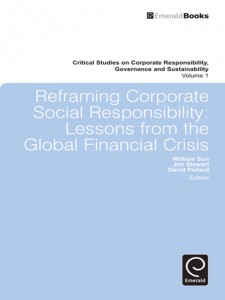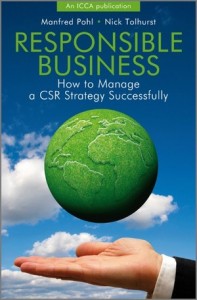CSR 2.0:
Beyond the Age of Greed
Chapter by Wayne Visser
Extract from Reframing Corporate Social Responsibility
Quotes
The point is, ladies and gentleman, that greed, for lack of a better word, is good. Greed is right, greed works. Greed clarifies, cuts through, and captures the essence of the evolutionary spirit. Greed, in all of its forms; greed for life, for money, for love, for knowledge has marked the upward surge of mankind. – Gordon Gekko, Wall Street (the movie)
Responsibility is literally what it says – our ability to respond. To be responsible is to be proactive in the world, to be sensitive to the interconnections, and to be willing to do something constructive as a way of giving back. Responsibility is the footprints we leave in the sand, the mark of our passage. What tracks will you leave? -Wayne Visser, Business Frontiers (the book)
Abstract
The 1987 movie Wall Street and our recent global financial crisis (GFC), despite one being fictional and the other painfully real, tell a common story. Over the past few decades, we have been living through an Age of Greed, characterised by a colossal failure of corporate responsibility and corruption of individual morality. This Crisis of Responsibility has had catastrophic consequences for the global economy, bankrupting whole economies (like Iceland) and wreaking havoc with the lives of ordinary citizens around the world, many of whom are now without a job and without a roof over their heads.

In this chapter, I want to explore the ways in which the GFC represents a multi-level failure of responsibility – from the individual and corporate level to the finance sector and entire capitalist system. I will also examine the impact of the GFC on what is traditionally viewed as corporate social responsibility (CSR). To conclude, I will set out my conviction
that unless CSR itself is fundamentally transformed, into CSR 2.0, it will do nothing to prevent an equally (if not more) devastating Crisis of Responsibility from recurring in future.
The Age of Greed
Gordon Gekko’s words, although spoken by a fictitious character of Oliver Stone’s imagination, captures the spirit of a very real age: the Age of Greed. This was an age that, in my view, began when the first financial derivatives were traded on the Chicago Mercantile Exchange in 1972 and ended (we hope) with Lehman’s collapse in 2008. It was a time when ‘greed is good’ and ‘bigger is better’ were the dual-mottos that seemed to underpin the American Dream. The invisible hand of the market went unquestioned. Incentives – like Wall Street profits and traders’ bonuses – were perverse, leading not only to unbelievable wealth in the hands of a few speculators, but ultimately to global financial catastrophe.
The story of Gordon Gekko (and his modern day real-life equivalents like Richard Fuld, the captain of the titanic Lehmans before it hit the iceberg) gets to the heart of the nature of greed …
Continue reading
[button size=”small” color=”blue” style=”download” new_window=”false” link=”http://www.waynevisser.com/wp-content/uploads/2012/04/chapter_wvisser_age_responsibility.pdf”]Pdf[/button] CSR 2.0: Beyond the Age of Greed (chapter)
Related pages
[button size=”small” color=”blue” style=”info” new_window=”false” link=”http://www.waynevisser.com/books/the-age-of-responsibility”]Page[/button] The Age of Responsibility (book)
Cite this chapter
Visser, W. (2010) CSR 2.0: From the Age of Greed to the Age of Responsibility, In W. Sun, et al. (eds.), Reframing Corporate Social Responsibility: Lessons from the Global Financial Crisis. Bingley: Emerald.








